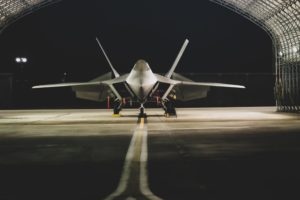
By: Ian Griffin
On February 4, 2023, two F-22 fighter jets from Langley Airforce Base in Hampton, Virginia, shot down a Chinese spy balloon over the Atlantic Ocean.[1] Since the Chinese spy balloon’s demise, the U.S. Air Force destroyed two more Chinese aircraft entering U.S. airspace.[2] The Chinese government is unhappy with the downing of their aircrafts, as Chinese officials are calling the U.S.’s use of force an overreaction, an attack, and a violation of “the spirit of international law….”[3] However, international and domestic law are seemingly on the United States government’s side.
There is no dispute that the United States retains sovereign authority over its lands, water, and airspace; Article IV of the U.S. Constitution clearly states, “The Congress shall have Power to dispose of and make all needful Rules and Regulations respecting the Territory or other Property belonging to the United States….”[4] Though the Founding Fathers could not foresee aviation technology of today, the Founders were smart to give Congress the plenary power dictated in Article IV.[5] In doing so, the Founders enabled Congress in 1994 to reinforce the U.S.’s exclusive sovereignty over its territories, particularly its airspace, when Congress enacted 49 U.S.C. Section 40103.[6] Section 40103 states “The United States Government has exclusive sovereignty of airspace of the United States….”[7]
The U.S. and China are both member states of the United Nations.[8] As member states, the U.S. and China must abide by the UN charter’s provisions.[9] Article I of the UN charter outlines the purpose of the UN, namely, “[t]o maintain international peace and security, and to that end: to take effective collective measures for the prevention and removal of threats to the peace, and for the suppression acts of aggression or other breaches of the peace….”[10] Further, Article II of the UN charter states that the UN organization is “based on the principle of the sovereign equality of all its Members.”[11] Article II then states that members shall “refrain in their international relations from the threat or use of force against the territorial integrity…of any state, or in any other manner inconsistent with the Purpose of the United Nations….”[12]
Taking U.S. federal law and the three UN statements together, the United States did not violate international law by destroying the Chinese aircraft. Rather, China violated international and U.S. federal law by entering U.S. airspace without authorization.[13] By breaching U.S. airspace, the Chinese government violates Articles I and II of the UN charter’s purposes and provisions.[14] Additionally, the Chinese government has no right to breach or to offend the territorial integrity of the U.S.[15] As such, the U.S. is within its right to protect its sovereign land by destroying the unauthorized Chinese aircraft.[16]
The fallout for the Chinese government does not lie solely in the remains of their spy balloons and other aircraft.[17] After the U.S. shot down the first Chinese spy balloon, the stock prices of various Chinese companies fell.[18] With the Chinese government refusing to take responsibility for its surveillance balloons, the United States canceled Secretary of State Anthony Blinken’s planned visit to China, which further deflated Chinese company stock prices.[19] The most likely reason for the stock prices deflating is the decrease in optimism that China and the United States can build on their relations.[20]
China is not the first country in recent memory to see its stock markets and companies damaged after violating another nation’s sovereign territory.[21] After invading Ukraine, Russia’s stock market crashed after numerous international sanctions and largely remains closed.[22] Though China’s stock market is not suffering as bad as the Russian markets, Chinese stock prices are likely to deflate further after the U.S. Department of Commerce slapped sanctions on six Chinese companies that support “China’s military aerospace programs.”[23] With more Chinese aircraft discovered, China’s markets face uncertainty as optimism in China-U.S. relations decreases with each F-22 missile strike.
[1] See Helene Cooper & Edward Wong, China’s spy balloon drifted for 7 days across the U.S.: A Timeline, N.Y. Times (Feb. 4, 2023), https://www.nytimes.com/2023/02/04/us/china-spy-balloon-time.html.
[2] See Ken Tran & Tom Vanden Brook, Discovery of unidentified unmanned aircraft sparks new concerns on Capitol Hill over US-China relations, USA Today, https://www.usatoday.com/story/news/politics/2023/02/12/united-states-china-relations-unidentified-objects/11242418002/ (last updated Feb. 12, 2023, 5:18PM).
[3] Julian Borger & Verna Yu, War of words over downed Chinese spy balloon continues as US recovers debris, Guardian (Feb. 6, 2023, 6:44PM), https://www.theguardian.com/world/2023/feb/06/china-accuses-us-of-overreaction-after-it-shot-down-high-altitude-balloon.
[4] U.S. Const. art. IV, § 3.
[5] See id.
[6] See, e.g., U.S. Const. art. IV, § 3; 49 U.S.C. § 40103.
[7] 49 U.S.C. § 40103.
[8] See Member States, U.N., https://www.un.org/en/about-us/member-states.
[9] See U.N. Charter art. 1.
[10] Id.
[11] U.N. Charter art. 2.
[12] Id.
[13] See U.S. Const. art. IV, § 3; 49 U.S.C. § 40103; U.N. Charter art. 1-2.
[14] See U.N. Charter art. 1-2.
[15] See U.S. Const. art. IV, § 3; 49 U.S.C. § 40103.
[16] See U.S. Const. art. IV, § 3; 49 U.S.C. § 40103.
[17] Aparna Narayanan, China Stocks Extend Losses As Spy Balloon Shooting Punctures This Hope, Invs. Bus. Daily (Feb. 6, 2023, 9:57 AM), https://www.investors.com/news/china-stocks-extend-losses-spy-balloon-shooting-punctures-sentiment/.
[18] Narayanan, supra note 17.
[19] See Michele Kelemen & Scott Simon, U.S. cancels Blinken’s visit to China after the appearance of a spy balloon, NPR (Feb. 4, 2023, 7:59 AM), https://www.npr.org/2023/02/04/1154473950/u-s-cancels-blinkens-visit-to-china-after-the-appearance-of-a-spy-balloon.
[20] See Narayanan, supra note 17.
[21] See Farah Elbahrawy, Putin’s War Makes Russian Stocks World’s Worst With Grim Outlook, Bloomberg (Dec. 18, 2022, 2:00 AM), https://www.bloomberg.com/news/articles/2022-12-18/putin-s-war-makes-russian-stocks-world-s-worst-with-grim-outlook.
[22] Id.
[23] See Tran, supra note 2.

